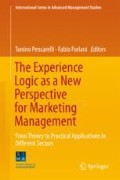Abstract
This chapter deals with a particular segment of the experience economy sector, i.e., experience gift box providers. The analysis is based on Wish Days, a former Italian company that, in 2016, was acquired by the international market leader Smartbox. This is an interesting field because such companies act as value net integrators that set up and offer a wide range of life experiences, which are then “packaged” and “put on a shelf” just like any other product. The marketing approach performed by these companies is mainly based on networking and emotional engagement.
Access this chapter
Tax calculation will be finalised at checkout
Purchases are for personal use only
Notes
- 1.
Hence the powerful ethical criticism of Rifkin (2000) on the commodification of human experiences.
- 2.
Taking the definition of “Tourism” provided by the World Tourism Organization, we can consider “tourist experiences” as a part of the life experiences for payment sector, which entail the transfer to the places where the experience is consumed, plus overnight accommodation there.
References
Addis M (2005) L’esperienza di consumo: analisi e prospettive di marketing. Pearson Prentice Hall, Milano
Badot O, Cova B (2008) The myopia of new marketing panaces: the case for rebuilding our discipline. J Mark Manag 24(1–2):205–219
Bartolazzi F, Forlani F, Fortezza F (2008) Caratteri e potenzialità degli eventi come “esperienze mediterranee”: Il caso “Palio de lo Daino”. Mercati e Competitività 4:71–99
Beck U (2007) Costruire la propria vita. Il Mulino, Bologna
Boswijk A, Thijssen T, Peelen E (2005) A new perspective on the experience economy: meaningful experiences. Pearson Education, Amsterdam
Busacca B, Grandinetti R, Troilo G (1999) Transizione del marketing e concezione sistemico-evolutiva del consumatore. In: Rullani E, Vicari S (eds) Sistemi ed evoluzione nel management. Etas, Milano
Carù A, Cova B (2007) Consuming experience. Routledge, New York
Clarke J (2008) Experiences as gifts: from process to model. Eur J Mark 42(3–4):365–389
Cova B (2003) Il marketing tribale. Il Sole 24 Ore Libri, Milano
Fabris G (2003) Il nuovo consumatore: verso il postmoderno. Franco Angeli, Milano
Fabris G (2008) Societing. Il marketing nella società postmoderna. Egea, Milano
Ferraresi M, Schmitt BH (2006) Marketing esperienziale. Come sviluppare l’esperienza di consumo. Franco Angeli, Milano
Fortezza F (2009) Approcci di Marketing Tribale: il caso Fichimori. In: Andreani JC, Collesei U (eds) The proceedings of 8th international conference marketing trends, Paris, 1999
Fortezza F (2014a) Meccanismi e logiche della produzione di esperienze. Impresa Progetto—Electronic Journal of Management 2:1–23
Fortezza F (2014b) Marketing, Felicità e Nuove Pratiche di Consumo. Fra sharing, baratto e accesso. Franco Angeli, Milano
Grönroos C (2009) Management e Marketing dei Servizi. Isedi, Torino
Gummesson E (1999) Total Relationship Marketing. Rethinking marketing management: from 4 Ps to 30 Rs. Heinemann, London
Lovelock C, Wirtz J (2007) Marketing dei Servizi. Risorse umane, Tecnologie, Strategie. Pearson Italia, Milano
Morace F (2005) De la consommation postmoderne à l’expérience méditerranéenne, d’une économie de l’œil à une économie de la langue. In: Silva F, Carù A, Cova B (eds) Marketing méditerranée et postmodernité. Editions Euromed, Marseille
Pencarelli T, Forlani F (2002) Il marketing dei distretti turistici-sistemi vitali nell’economia delle esperienze. Sinergie Italian Journal of Management 58:231–277
Pencarelli T, Forlani F (2016) Marketing of touristic districts-viable systems in the experience economy. Sinergie Italian Journal of Management 34(101):199–238
Pine BJ, Gilmore JH (1999) The experience economy. Work is theatre & every business a stage. Harvard Business School Press, Boston
Pratesi CA (2002) Tendenze in atto nel business del tempo libero. In: Resciniti R (ed) Economia e marketing del tempo libero: profili e prospettive di un’industria emergente. Franco Angeli, Milano
Resciniti R (2004) Il marketing orientato all’esperienza: l’intrattenimento nella relazione con il consumatore. Edizioni Scientifiche Italiane, Napoli
Resciniti R (2008) Introduzione. Il marketing e l’esperienza del consumatore. Mercati e Competitività 4:13–15
Rifkin J (2000) L’era dell’accesso. La rivoluzione della new economy. Mondadori, Milano
Schmitt BH (1999) Experiential marketing. The Free Press, New York
Valdani E (2000) L’impresa proattiva. Co-evolvere e competere nell’era dell’immaginazione. McGraw-Hill Italia, Milano
Valdani E, Guenzi P (1998) Il marketing nei parchi tematici. Egea, Milano
Wakefield KL, Blodgett JG (1994) The importance of servicescapes in leisure service settings. J Serv Mark 8(3):66–76
Yin RK (1994) Case study research: design and methods, 2nd edn. Sage Publications, Newbury Park
Author information
Authors and Affiliations
Corresponding author
Editor information
Editors and Affiliations
Rights and permissions
Copyright information
© 2018 Springer International Publishing AG, part of Springer Nature
About this chapter
Cite this chapter
Fortezza, F., Dusi, A., Pencarelli, T. (2018). How Marketing Works in the Experience Economy: The Case of the Experience Gift Box Providers. In: Pencarelli, T., Forlani, F. (eds) The Experience Logic as a New Perspective for Marketing Management. International Series in Advanced Management Studies. Springer, Cham. https://doi.org/10.1007/978-3-319-77550-0_6
Download citation
DOI: https://doi.org/10.1007/978-3-319-77550-0_6
Published:
Publisher Name: Springer, Cham
Print ISBN: 978-3-319-77549-4
Online ISBN: 978-3-319-77550-0
eBook Packages: Business and ManagementBusiness and Management (R0)

